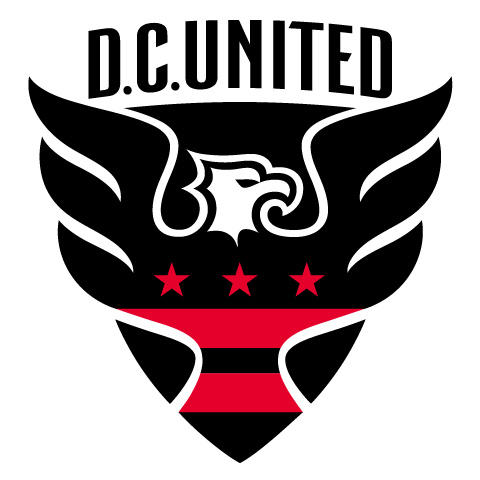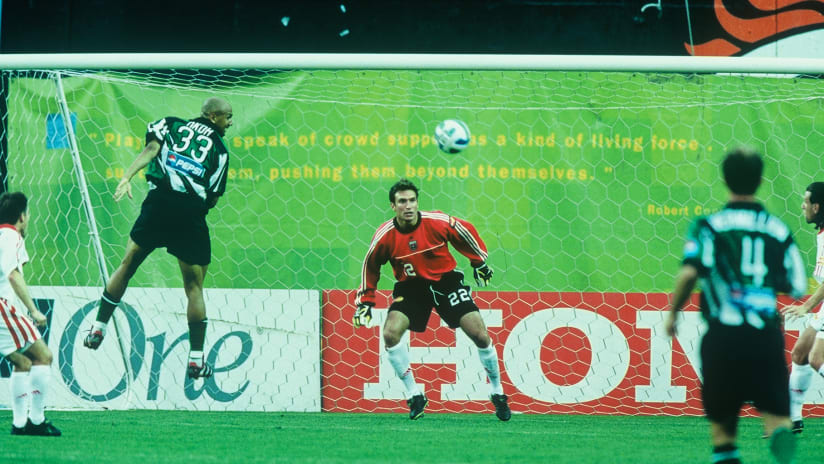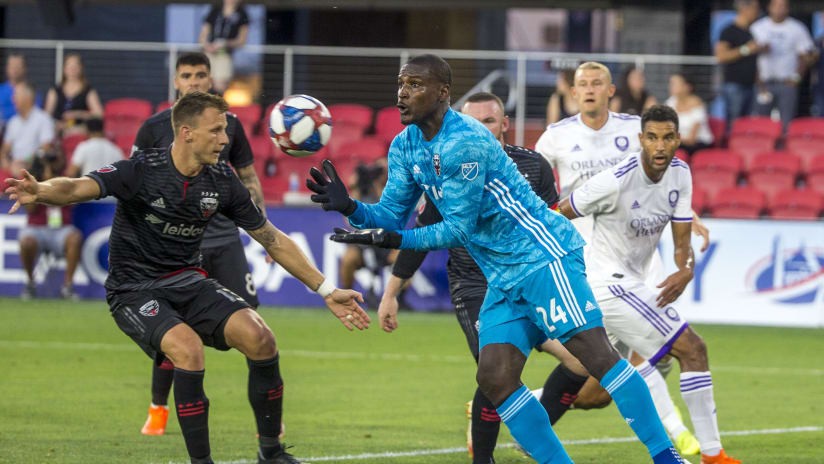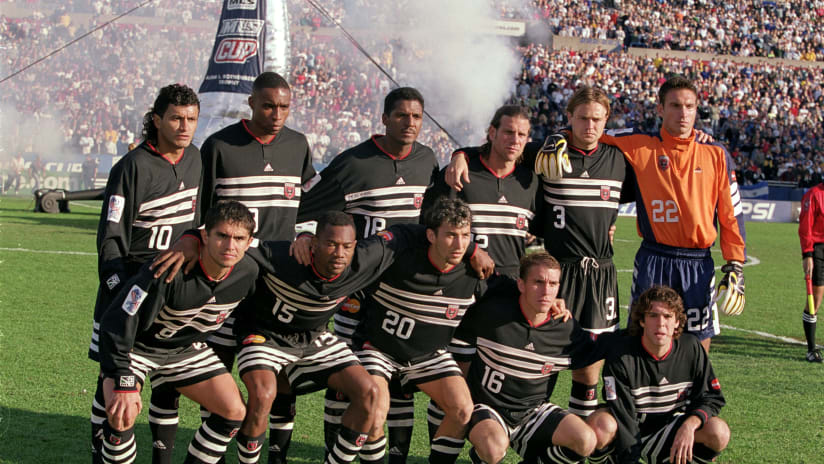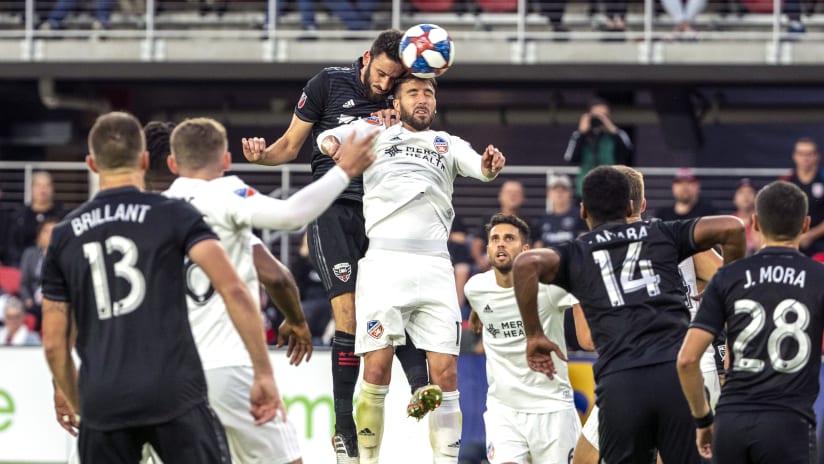Twenty years ago, on Nov. 21, 1999, D.C. United captured its third MLS Cup in four seasons to cement its legacy as the first true dynasty in league history, a claim that would be strengthened when the Black-and-Red captured another title five years later. And on that balmy November afternoon at Foxboro Stadium, before a raucous crowd of nearly 45,000 fans, United bested the LA Galaxy in a 2-0 victory that served as the capstone for a remarkable campaign.
That season, under the direction of first-year coach Thomas Rongen, United posted the best record in MLS (23-9), scored the most goals in MLS (65) and finished with the best defensive performance in franchise history (43 goals conceded). Defender Jeff Agoos, midfielder Marco Etcheverry and forward Jaime Moreno were all named to the MLS Best XI, tied with the Galaxy for the most players from a single team.
Over the next few weeks, we will recreate the ’99 season through the memories of those who lived it: the players, coaches and staff members who exorcised their demons from a crushing defeat in the 1998 MLS Cup to hoist a trophy and parade it through the streets of Washington D.C., rewarding those faithful fans who had stuffed RFK Stadium to its capacity all year.
Our next viewpoint comes from goalkeeper Tom Presthus, who joined the club in ’97 and earned a starting spot toward the end of ’98, prior to the playoff run. But the ’99 season marked the first year in which Presthus entered training camp as the starter, and he rewarded the Black-and-Red with a regular season record of 17-8, a postseason record of 5-1 and the club’s third MLS Cup in four years. He remained with the club through the 2000 season before moving to Columbus for three seasons with the Crew.
iTunes | Spotify | Stitcher | Google Play | SoundCloud
Q: Going into ’99, did you know you had the starting job secured? Or was that a competition with Mark Simpson from day one?
A: I think that year was a little bit different because for the first two years I was with the club, there were a lot of changes within the goalkeeping ranks. Scott Garlick and I were kind of battling back and forth. Scott moved on to Tampa. It felt like, to me, that the club had made a decision that they wanted to go in that direction with me. Mark Simpson, the other goalkeeper, was coming back from injury. I had felt more confident that year that it was my position to lose.
How did you handle the adjustment from Bruce Arena to Thomas Rongen? And how did that play into anything you needed to do stylistically or tactically?
A: I don’t know if I did. I think that I was pretty naïve at that time in my career, where I probably didn’t give it much thought, you know? We obviously had a great deal of success with Bruce, and Bruce was — I don’t think it’s a secret — a fantastic coach. His secret was that he knew how to push buttons of players and get the most out of players.
And Thomas came in a with a different mentality. Being a former professional player, you know, he was kind of a guy’s guy and liked to hang out with the guys and just give each other confidence. As a group, we already had a lot of confidence even though we lost in the final the previous year. For the most part, the group still felt really confident about our ability, so it was just a matter of Thomas encouraging us and keeping us light, helping us enjoy the season as much as possible.
Due in large part to where you are positioned on the field, goalkeepers see the game a little bit differently than anybody else. So I’m curious, from your vantage point throughout your time with the club, and especially toward the beginning of that ’99 season, when D.C. United was on and playing as well as it could, what did it look like? Why was it so effective?
A: Looking back on it, the biggest thing for me with that club is that, especially in those first couple years, no matter what the score, no matter how much time is left in the game, we had a belief in ourselves that we’d figure out a way to win. And so if you look back on some of those results, you could see where you’d think there’s no opportunity for us to come back, but that was never a thought in our heads. Until the final whistle, we thought we were going to win every single game, regardless of the score at the time. And I think that was the strongest characteristic that we had.
It was a group that really enjoyed being around each other. We competed in games together, but training was ultra-competitive as well. Ping pong matches in the locker room were ultra-competitive. We had a unique advantage early on in MLS that we were one of the only clubs with that training facility. And the camaraderie that was built by having a clubhouse to be in and spending time together was huge in forming a relationship where we could really trust each other on the field. And I think that that came through in the way that we were able to battle no matter what the circumstance was, no matter what the score was. So that’s the thing that I remember way more than any tactics or style of play or anything like that.
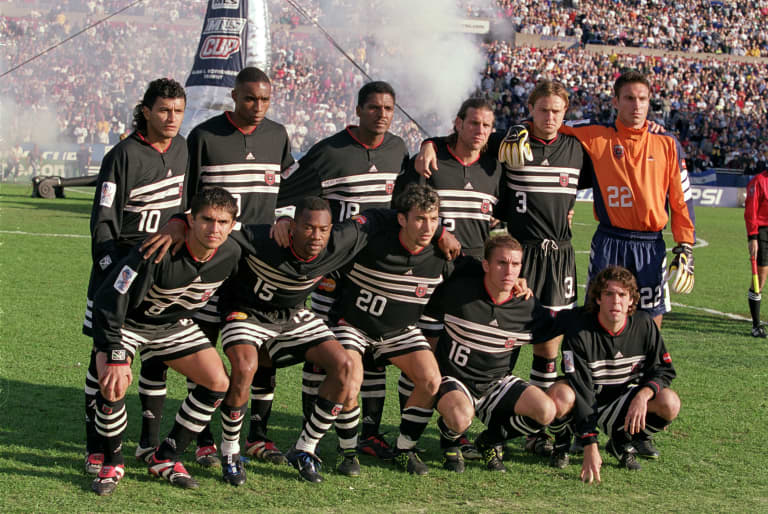
There were a number of guys who shuffled through the back line at times throughout that season, but some of the mainstays were Eddie Pope and Jeff Agoos and Carlos Llamosa. Carey Talley was in there as well. When you think about that back line, what was it about the chemistry between you and them that made the back end so strong?
A: The biggest thing was it gave so much confidence to the players in front that they could leave those defenders isolated 1v1, 2v2, 3v3, 1v2 in situations and you knew that those players were strong enough to take care of business back there and win battles. So what that allows is it freed everybody up in front to play with some creativity and freedom and express themselves.
I think back on a lot of situations where it was my job just not to give the goal away, you know? If I could stay back and stay as big as possible, without giving that goal away, it would allow either Eddie or Carlos or Jeff or Richie (Williams) or Carey Talley to recover in time to block the shots that were needed. One of the things that I do remember is situations where Eddie Pope, you know, would remind me, ‘Just stay back in goal. Give me time to recover. Don’t give anything away.’ And I think looking at Eddie Pope, he’s clearly one of the best defenders that this league has ever seen. And in combination with Jeff and Carlos and Carey and Richie, what a combination back there. It made my job very easy.
One thing that I didn’t mention was no matter how fun it is to play with a group of defenders like that in front of you, it is actually kind of difficult to be a goalkeeper in that situation as well. Because really, one of the easiest things as a goalkeeper is to be in the game all day, face eight or 10 shots.
The toughest thing for us as goalkeepers, whether it was Scott Garlick, myself or Mark Simpson in ’99 with me, is staying focused in order to come up with that one, maybe two big saves a game. And that was a challenge. But it was also a great season to watch the rest of the game unfold for most of it.
I spoke to Mark Simpson earlier, and he was very complimentary of the relationship that you guys had. With Simpson coming back from injury, he said he was just glad to be out there. And when he was out there in the games where you got nicked up or had the night off, you were his biggest supporter and vice versa. How do you remember that relationship? And why is it so important to have a positive relationship between goalkeepers given how much time you guys spend on your own?
A: The thing that I probably remember most from the championship game is Mark and our goalkeeper coach Alan Kelly Jr. being the first ones to come up to me after the game. And Mark just coming up with a huge hug and saying how happy he was for me to get to experience this. We had lost a tough one in ’98 the year before. He had a chance to win a championship in ’96. Then Scott Garlick was there for the ’97 championship. That meant so much.
And it was a culmination of the relationship that we had. We roomed together. We played a lot of golf together. He’s a much better golfer than I ever was. But to your point, we spend a lot of time as goalkeepers isolated from the rest of the team and working together. So when you have that relationship where it’s pushing each other to be the best but at the same time knowing that you can confide in each other and talk to each other about the challenges that we face, it certainly makes the job so much easier. And I’ll be forever grateful for that experience I had with Mark.
I want to ask you about the playoff run. Everybody remembers the Columbus series in the Eastern Conference Finals. You win Game 1. Then you go to Columbus and kind of get blasted, to be honest, 5-1. And then you come back and it’s Game 3, do or die at RFK Stadium. What do you remember about that series?
A: The crazy thing is I don’t remember a lot of games. This is a terrible thing to say, but I did have a lot of concussions in my career so I can blame that. But the truth is, that was never something important to me, to remember exact plays in games. But one thing that I do remember from that series is (Columbus Crew forward) Stern John juggling when it was probably 5-1 during the game. And I think it was that moment where after the game it was such a, you know, who the (heck) does he think he is? They’ve got another game to come and play. And I think at that point there was no chance that Columbus had a chance to win the next game.
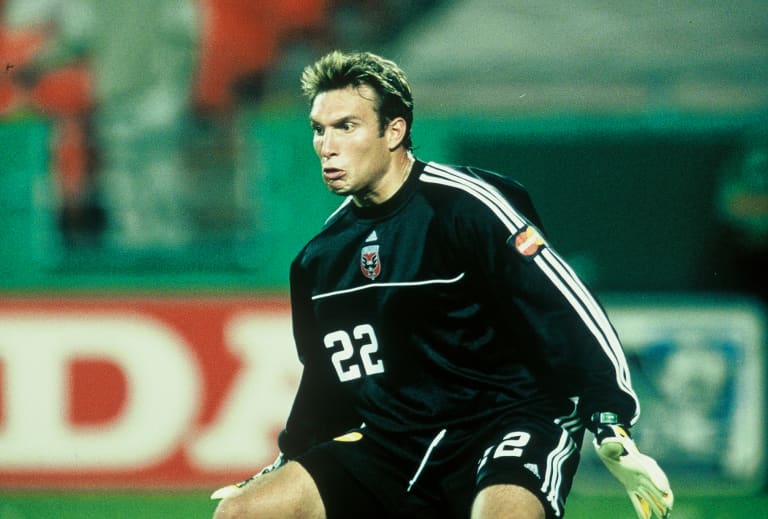
Building off that, Thomas Rongen told me he remembers Eddie Pope, who didn’t speak up a whole lot, coming into the locker room after Game 2 in Columbus and saying something to the effect of, ‘Over my dead body’ will the Crew advance to MLS Cup. Do you remember that?
A: I don’t remember Eddie specifically saying that, but it doesn’t surprise me. I think it was the attitude that everybody had. It was nice to get a good embarrassment to remind us that, you know, we had to be prepared for every game. But yeah, I think it goes back to the idea that I don’t think we ever thought we were going to lose that series, regardless of losing that game 5-1. It just wasn’t even a — I don’t think we ever went into a game thinking we’d ever lose.
And Thomas is absolutely right: Eddie didn’t speak up very much, but when he did, he had everybody’s attention. That’s for sure.
In that Game 3, I was looking through the box score and you actually had an assist. Do you remember how that happened?
A: I do recall having an assist just because it came up a couple years ago when another goalkeeper had an assist in MLS. It showed all of the goalkeepers who had an assist. So the thing that I remember most about our style of play was I had one responsibility. When I got the ball, I was (told) to find Marco. And so I would assume that it was probably a throw or a pass out to Marco that led to maybe a hockey assist.
I know that there’s not many goalkeepers in the league that have assists. I think I have two. So I’m happy for that opportunity. But I think most of the hard work was probably done by somebody else.
Was part of the reason you guys were so confident — not only in that Game 3, but in general — because of the support and the crowds you had at RFK?
A: For me, it’s the only thing that I had experienced in those first couple years of my career, so I didn’t know anything different. But it was such a huge advantage to play at RFK. It was such a unique environment compared to the rest of the league. It was passionate fans, but also very knowledgeable fans. They’d let you know if you weren’t playing up to the standard as well. It was a situation where you played for the fans — and you played for your teammates, obviously — but you just didn’t want to let them down. So it was such a humbling experience to play in that environment in front of such passionate and knowledgeable and energetic fans. It’s something that I’ll remember forever.
You mentioned what it felt like at the end of MLS Cup, but I’m curious about the buildup or the moments before the match. Were you the type to get nervous? Were you anxious? What was it like getting ready for that game?
A: I’m sure I was nervous and anxious. As a player, I was always really superstitious so I would go through a routine. But I think we felt prepared. I felt prepared. The conditions on the field were poor. But I don’t think any of that really — I don’t remember too much of that resonating with us. Again, maybe it was just being young and naïve. But for me, that was my third championship that I’d been involved in. So I think we were all pretty comfortable being in that environment, and I don’t think the stage was too big for any of us. So that was a huge advantage. Fortunately, we got some pretty good breaks in that game, some of it field-related.
The one thing that I do remember from pregame is the fact that Christina Aguilera sang the national anthem. That’s where she got her start, in MLS Cup 1999 singing the national anthem. (Laughs)
What were some of your superstitions?
A: Oh god, it was everything. Whether it was the pregame music that I listened to, the way that I would put my uniform on — the socks, shin guards, the sequence. One of the big things for me was I didn’t want any opposing players drinking water from around our goal, so I’d get rid of all the water bottles that were lined up around the field and I’d just have my one water bottle. Things like that. Stretching routines. I mean, it was terrible.
And it was funny because it wasn’t like I was playing great to get those superstitions. But in my head I was always like, ‘You know, you could play so much worse if you didn’t do it.’ I guess it all had its purpose, right? To get me in the right mind frame. But the superstitions started to take a life of their own after a while.
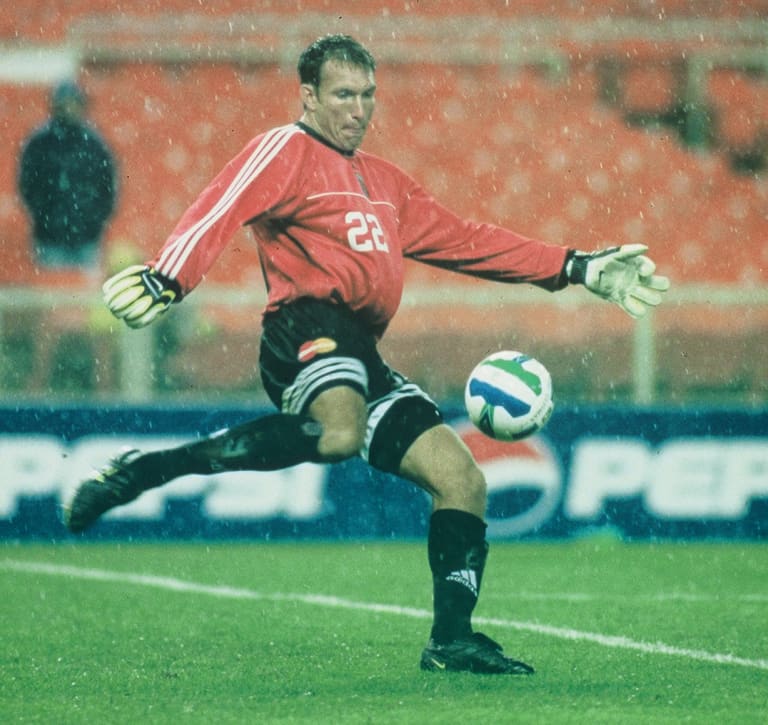
You guys took the lead in the 19th minute when Jaime pokes the ball into the net. The whole team, it seemed like, ran behind the goal and started celebrating with the supporters’ section. I think there was some kind of confetti coming down from someplace. You were on the opposite end of the field. How did you celebrate?
A: I was probably pumping my fist, running up and down, wanting to be down on the other end. It is pretty isolating back there as a goalkeeper. One of the biggest plays of that game is Richie Williams clearing one off the line. That’s something I remember as well. It must have been on a corner or a free kick. But he was on the post and clearing one off the line. Keeping that out of the back of the net obviously changes the dynamic of the game. It was obviously key for us to get that early goal from Jaime. It was key that (Galaxy defender) Robin Fraser got injured in that game. There were a lot of breaks that kind of fell in our direction, that’s for sure.
You mentioned remembering that embrace with Mark Simpson and your goalkeeper coach. What was the celebration like that night? What did it mean to you to be in goal for that game?
A: It meant a lot to me (because) ’98 was a tough final to lose. That is one game that I remember a great deal from. The funny thing is that before the ’99 season, the referees came around to do a symposium and talk about the rule changes for the year. And they brought up both of those goals from that ’98 final and talked about how they’d done a review on them and both of them were offsides. It was funny because that was in preseason and it kind of set the tone, you know? That wasn’t a goal and that wasn’t a goal. We all jumped up and down. Yeah! We should have won that game.
I think that actually was really important for me because it took whatever pressure I had built up internally, it took a little of that off. I could say, ‘OK, this wasn’t my fault.’ I’ve had a chance to reflect, I know it wasn’t my fault that we lost those games. But as a young player, that’s what you think at the time.
So after the final in ’99, it was certainly interesting because on one side of it we’ve been in so many championships that it kind of felt like this is normal, this is what we should be doing. But at the same time, for me it was like OK, I’ve gotten a little of that monkey off my back and I’m in that group of D.C. United goalkeepers who have won a championship.
Now that it’s 20 years later, when you have a chance to either catch up with some of your old teammates or maybe you run into guys here and there, what type of memory is it? Is that season something you still hold near and dear?
A: Yeah. I’m incredibly proud of the things that we accomplished in the beginning of MLS. MLS has really grown. It’s a league that doesn’t look very much like the league that was 20 years ago. But I think that us old players — older players — we have a lot of pride in what we did to help grow the sport in the United States. And sometimes that’s forgotten, but when we get together it’s certainly not forgotten.
That’s the great thing about teammates is you have a bond forever, and when we see each other it’s like we had just been out at training or just finished a game the day before. The relationships are very strong, the bond is really strong and it’s something that we’ll have as a shared experience for the rest of our lives.
